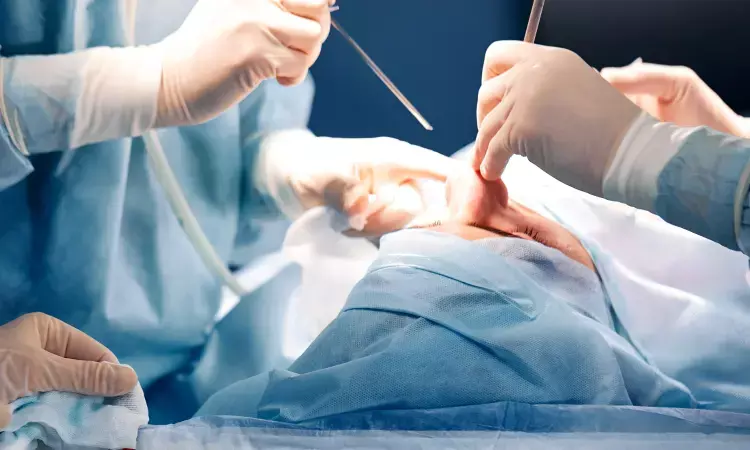- Home
- Medical news & Guidelines
- Anesthesiology
- Cardiology and CTVS
- Critical Care
- Dentistry
- Dermatology
- Diabetes and Endocrinology
- ENT
- Gastroenterology
- Medicine
- Nephrology
- Neurology
- Obstretics-Gynaecology
- Oncology
- Ophthalmology
- Orthopaedics
- Pediatrics-Neonatology
- Psychiatry
- Pulmonology
- Radiology
- Surgery
- Urology
- Laboratory Medicine
- Diet
- Nursing
- Paramedical
- Physiotherapy
- Health news
- Fact Check
- Bone Health Fact Check
- Brain Health Fact Check
- Cancer Related Fact Check
- Child Care Fact Check
- Dental and oral health fact check
- Diabetes and metabolic health fact check
- Diet and Nutrition Fact Check
- Eye and ENT Care Fact Check
- Fitness fact check
- Gut health fact check
- Heart health fact check
- Kidney health fact check
- Medical education fact check
- Men's health fact check
- Respiratory fact check
- Skin and hair care fact check
- Vaccine and Immunization fact check
- Women's health fact check
- AYUSH
- State News
- Andaman and Nicobar Islands
- Andhra Pradesh
- Arunachal Pradesh
- Assam
- Bihar
- Chandigarh
- Chattisgarh
- Dadra and Nagar Haveli
- Daman and Diu
- Delhi
- Goa
- Gujarat
- Haryana
- Himachal Pradesh
- Jammu & Kashmir
- Jharkhand
- Karnataka
- Kerala
- Ladakh
- Lakshadweep
- Madhya Pradesh
- Maharashtra
- Manipur
- Meghalaya
- Mizoram
- Nagaland
- Odisha
- Puducherry
- Punjab
- Rajasthan
- Sikkim
- Tamil Nadu
- Telangana
- Tripura
- Uttar Pradesh
- Uttrakhand
- West Bengal
- Medical Education
- Industry
Isotretinoin as adjuvant to rhinoplasty increases cosmesis and patient satisfaction

Use of Isotretinoin as an adjuvant to rhinoplasty may increase cosmetic and patient satisfaction suggests a new study published in the International Journal of Dermatology.
Isotretinoin has been used in the treatment of acne for decades through the reduction of sebaceous secretion. There are reports in the literature that isotretinoin may be associated with decreased skin thickness, especially in patients with thick nasal skin for whom rhinoplasty can be more challenging. The objective of this study was to quantify, through ultrasonography, the effect of the use of oral isotretinoin in patients undergoing rhinoplasty, pre- and postoperatively.
Twenty-four patients participated in this randomized, single-blind controlled pilot clinical trial. The intervention group used oral isotretinoin (20 mg/day) for 2 months before rhinoplasty and for 4 months after. Both groups underwent rhinoplasty in the same plastic surgery department and were submitted to high-frequency (22 MHz) ultrasound evaluation of the epidermis and dermis on the nasal dorsum, nasal tip, and left nose wing at the beginning of the study and 6 months after rhinoplasty, with the aim of assessing changes in skin thickness.
Results
Six months after rhinoplasty, a statistically significant reduction was observed in the thickness of the epidermis and dermis of the nasal dorsum and left nose wing, as well as of the epidermis of the nasal tip, but only in the intervention group. The results of the satisfaction questionnaire were better after rhinoplasty in both groups, with no statistical difference between them regarding the specific questions; however, the intervention group had significantly higher satisfaction scores than the control group.
Isotretinoin was effective in reducing the thickness of the skin covering the nose of the evaluated sites.
Reference:
Silveira, C.S.C., Azulay-Abulafia, L., Barcaui, E.O., Silva, M.M.M. and Roxo, A.C.W. (2023), Analysis of the use of isotretinoin as an adjuvant in rhinoplasty. Int J Dermatol. https://doi.org/10.1111/ijd.16924
Keywords:
Use, Isotretinoin, adjuvant, rhinoplasty, may, increase, cosmetic, patient, satisfaction, Silveira, C.S.C., Azulay-Abulafia, L., Barcaui, E.O., Silva, M.M.M. and Roxo, A.C.W.
Dr. Shravani Dali has completed her BDS from Pravara institute of medical sciences, loni. Following which she extensively worked in the healthcare sector for 2+ years. She has been actively involved in writing blogs in field of health and wellness. Currently she is pursuing her Masters of public health-health administration from Tata institute of social sciences. She can be contacted at editorial@medicaldialogues.in.
Dr Kamal Kant Kohli-MBBS, DTCD- a chest specialist with more than 30 years of practice and a flair for writing clinical articles, Dr Kamal Kant Kohli joined Medical Dialogues as a Chief Editor of Medical News. Besides writing articles, as an editor, he proofreads and verifies all the medical content published on Medical Dialogues including those coming from journals, studies,medical conferences,guidelines etc. Email: drkohli@medicaldialogues.in. Contact no. 011-43720751


